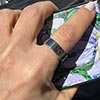This past weekend, a number of major celebrities, including Jennifer Lawrence, Kate Upton and Victoria Justice, suffered a complete and total loss of privacy when their nude photos were leaked on the Internet. That’s scandalous on its own, but what seriously concerned me about the story is this: The hackers stole the photos off iCloud. Exactly how isn't clear, though Apple did make a statement that it was a targeted attack on celebrity accounts. "We have discovered that certain celebrity accounts were compromised by a very targeted attack on user names, passwords and security questions."
Both Apple and the FBI are currently on the case, tracking down those responsible for the hack. For the celebrities, though, the damage is already done.
Some celebrities involved did not know their photos were being backed up to the iCloud service. (You can check on what's being backed up to iCloud by going to Settings > iCloud. There you can turn off iCloud back up for photos under "Photos" and other types of documents under "Documents & Data".) Others were unaware the photos still existed, even after being deleted from their phones (If Photo Stream is enabled, deleting a photo from your phone will only remove the local copy. You can turn off Photo Stream in Settings > iCloud > Photos.). And surely, all thought that something like this couldn't happen to them.
But it did happen. And if it happened to them, it could happen to you. Or me. Or anyone.
The best way to stay safe is, of course, to not take or share compromising photos of yourself. Realistically, though, many people already have – over half of Americans admit to sending or receiving sexual content via text. Once that content is shared, you lose exclusive control over who sees what. That's important to remember.
Otherwise, be aware of what, where and how your phone backs up. Back up your cloud accounts with two-step authentication when possible (it's available for iCloud, Google accounts, Microsoft accounts, Dropbox and online file storage services), be sure to always choose strong passwords when protecting sensitive data and lie when setting up security questions.
Has something like this hack happened to you or your family? If so, stay calm – there's a lot you can do to mitigate the damage. Check out our tips for managing a loss of privacy with our “Your Nude Photos are on the Internet: Now What?” piece.
















From Peter Shaw on September 04, 2014 :: 10:52 am
If you post nude photos then you are at risk.
Reply
From Josh Kirschner on September 04, 2014 :: 4:52 pm
Each of the victims here took nude photos with their iPhones, and then those photos were synced up to users’ personal iCloud accounts (either knowingly or unknowingly). Those personal accounts were then hacked.
If your comment was intended to mean “don’t put nude photos in the cloud”, that’s good advice (though it appears not all the victims even realized they were doing that), especially if you’re a celebrity. And even if you keep them just on your home computer, it’s safest to place them in an encrypted vault in case your computer is stolen or someone else gets access to it.
As for whether you should be taking nude photos at all, that’s up to you. But if you do, just be aware of how to properly protect them.
Reply